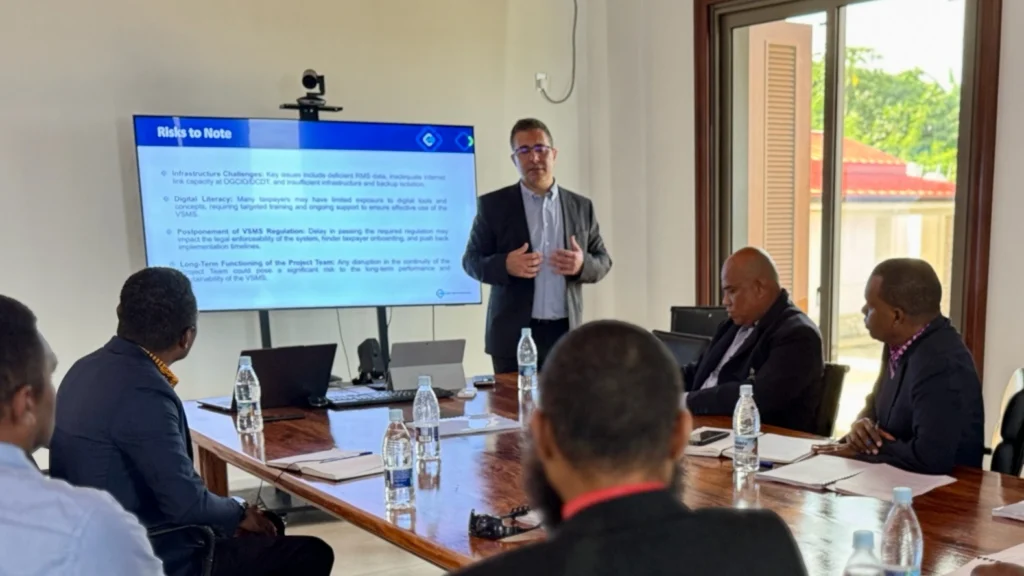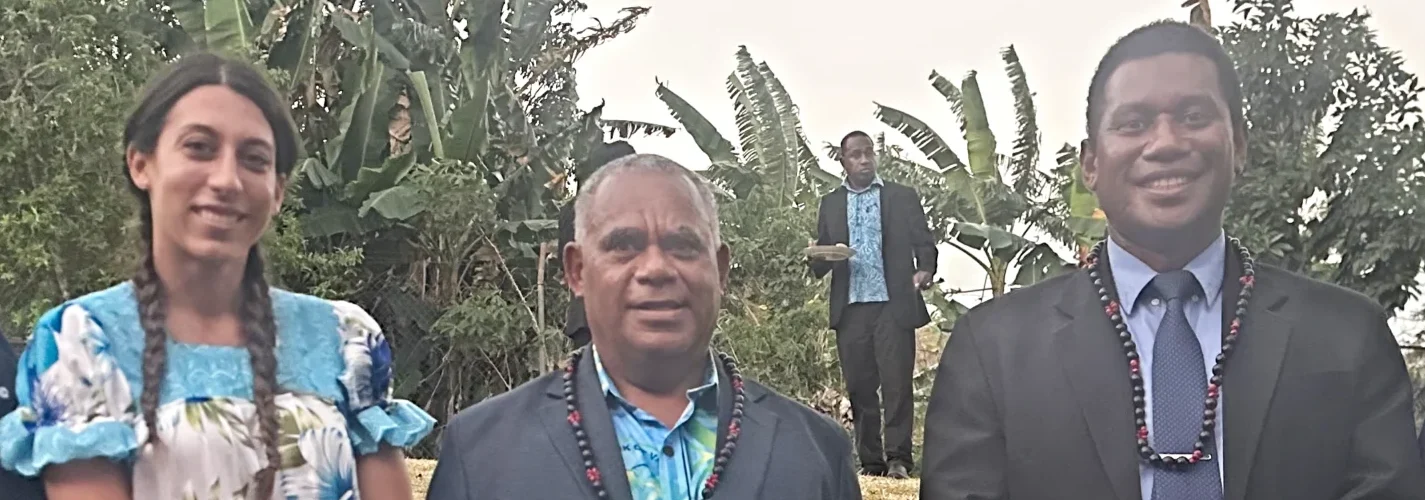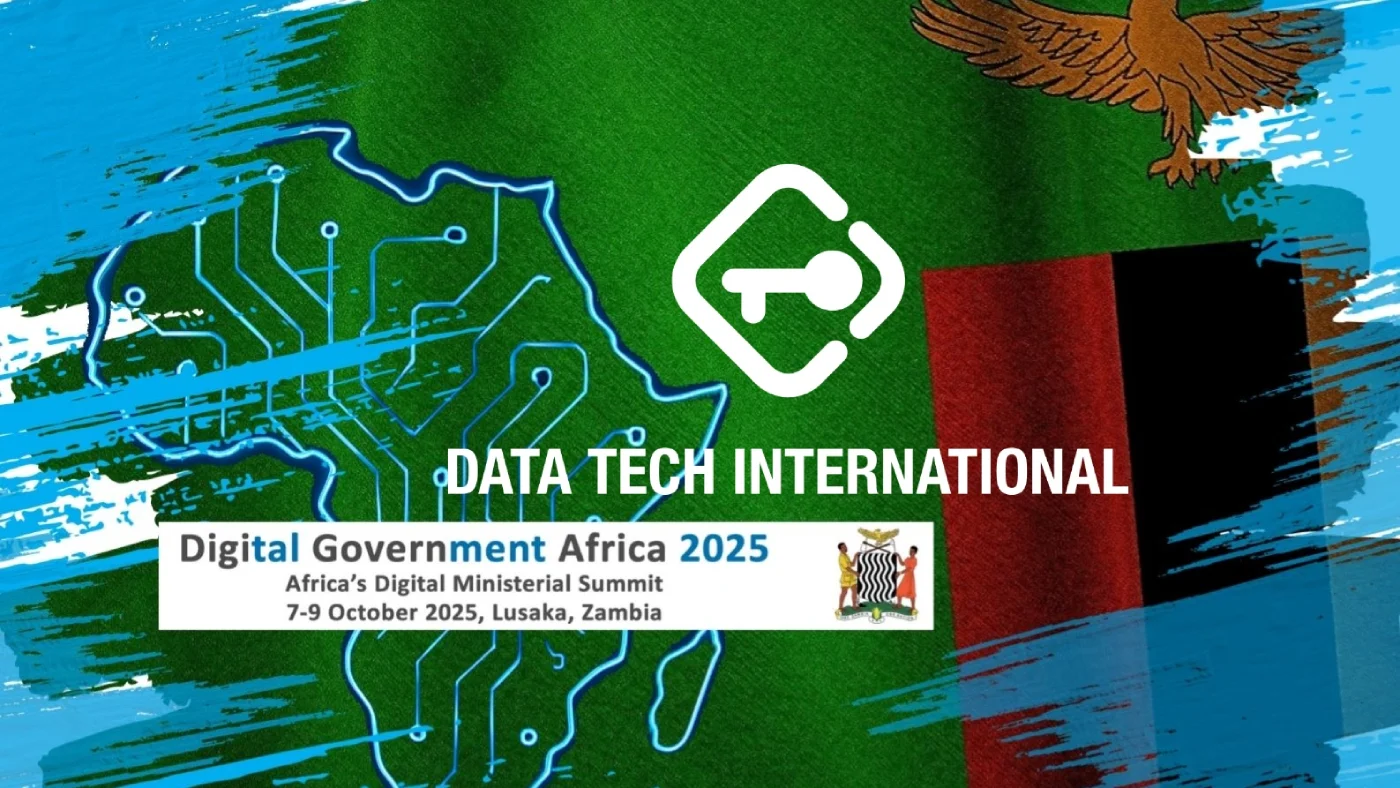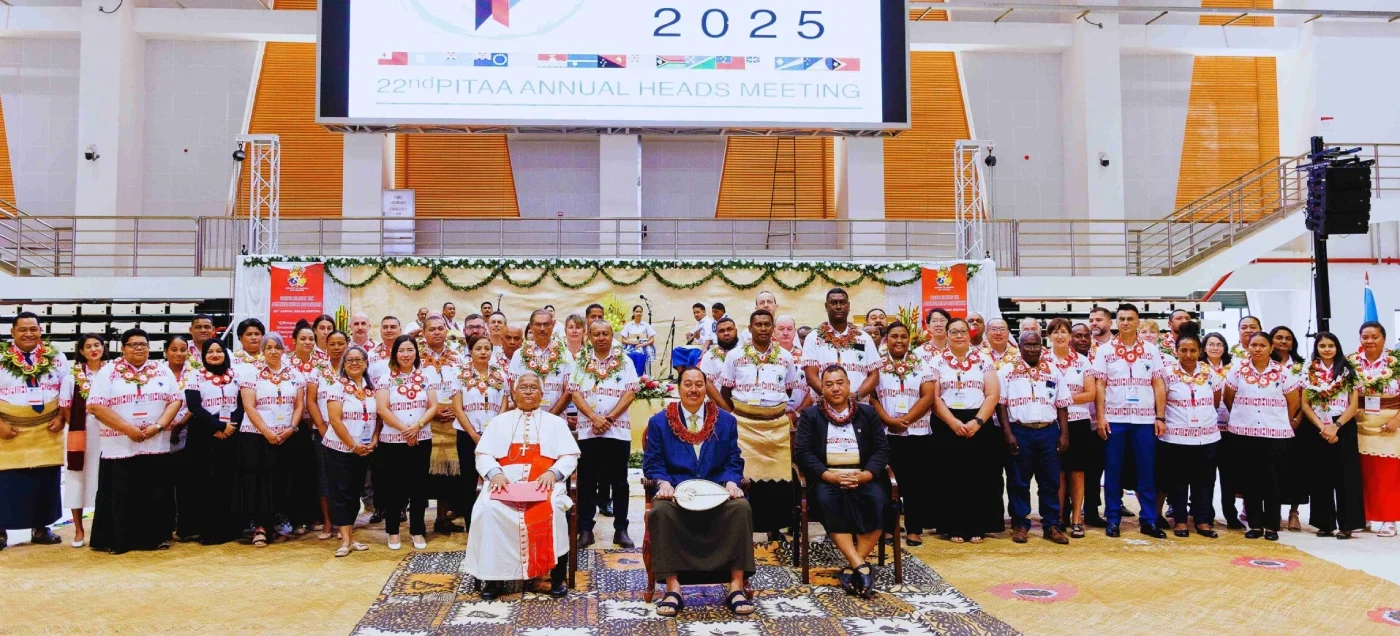On a humid morning in Port Vila, the capital of Vanuatu, where coconut palms sway over corrugated rooftops and market stalls hum with chatter, Collins Gesa leans back in his office chair, his expression as sharp as the problem he has spent his career chasing. “Tax compliance has always been a big challenge,” he says, his tone steady, his eyes betraying no weariness. “The tax gap has always been a big challenge as well.” To his account, this is where we start, as Vanuatu is making an e-Invoicing move that will bring order to this uneven playing field.
For Gesa, the Deputy Director of Inland Revenue at Vanuatu’s Ministry of Finance, the sentence is the central dilemma of governing this South Pacific nation of just over 300,000 people spread across 83 islands. His department does collect money, yes, but that money keeps the lights on in schools, funds healthcare, maintains ports, and pays for the asphalt that connects villages to towns as well. Revenue is the bloodstream of the government, and for years too much of it has been slipping away into a shadowy maze of unrecorded cash transactions.
Rewriting the Rules of Taxation – Locally
Now, in a move that would sound ambitious in far larger economies, Vanuatu is locally rewriting the rules of taxation. The solution: a fully digitized tax monitoring system, designed to catch in real time what once vanished without a trace. The name is as technical as it is unassuming, the Value Added Tax Monitoring System, or VSMS powered by Data Tech International’s TaxCore, but behind it lies a confident idea. “It is a full-fledged journey,” Gesa says, a hint of pride creeping into his usually clipped delivery. And he means it literally: the journey from manual ledgers and patchwork reporting to e-invoicing powered by live data.
The Ministry of Finance and Economic Management, through the Department of Customs and Inland Revenue (DCIR) led by Mr Harold Tarosa, is preparing to roll out the new Vanuatu Sales Monitoring System (VSMS) to improve Value Added Tax (VAT) collection nationwide. The system will be introduced between August 2025 and January 2026.
At the heart of this shift is a partnership with Data Tech International (DTI), a company with global experience in fiscal solutions, and its platform Taxcore, which is powering VSMS. As always, the collaboration is much more than a technical handoff but a daily, evolving dialogue, one that, in Gesa’s telling, has already given his team a newfound sense of confidence.
5 Key Takeaways
1. From Informal Chaos to Digital Order: Vanuatu’s economy has long been dominated by an informal cash sector that left government coffers starved. With VAT as the country’s financial lifeline, the introduction of the Value Added Tax Monitoring System (VSMS) powered by Data Tech International’s TaxCore is designed to bring transparency and accuracy to revenue collection.
2. A Partnership That Fits Local Realities: Unlike one-size-fits-all solutions, the collaboration between Vanuatu’s Inland Revenue Department and Data Tech International has been deeply customized. Learning from Fiji and Samoa’s experiences, Vanuatu tailored the e-invoicing system to its own context, with DTI working closely alongside a dedicated local project team.
3. Real-Time Data, Real-Time Accountability: Every transaction in the system generates an e-invoice that is logged instantly. This live data stream ends the old reliance on quarterly filings and guesswork, giving policymakers the tools to monitor revenue, plan budgets, and address gaps with precision, even when offline.
4. Businesses as Partners, Not Targets: For Vanuatu’s enterprises, especially small and medium-sized ones, VSMS simplifies record-keeping and VAT filing, reducing administrative headaches. Collins Gesa emphasizes collaboration rather than punishment, framing taxation as a shared responsibility between government and business.
5. A Cultural Shift Toward Compliance: Tax evasion once thrived in the shadows of a cash economy, but the digital paper trail changes the game. Compliance will rise not because penalties will grow harsher, but because underreporting will no longer be easy or safe. The bigger achievement, Gesa suggests, is cultural: building a modern state where paying tax is part of the national identity.

Vanuatu e-Invoicing: An Old Problem, A Modern Fix
For decades, Vanuatu’s tax structure has leaned heavily on self-assessment. Businesses were expected to keep tidy records and file truthful VAT returns. In theory, this was straightforward. In practice, in a nation where the informal sector dwarfs the formal economy, compliance was more guesswork than science. Receipts were optional, record-keeping uneven, and cash, untraceable, pliable, and ever-present. The result was predictable: government coffers ran short while a hidden economy thrived.
“We have a very small formal system compared to what we have in the informal system, which is a very huge sector,” Gesa explains. His words carry the candor of someone who has spent years watching public finances bleed out in silence. But unlike many of his peers in larger nations, Gesa did not have the luxury of waiting. Vanuatu does not levy personal income tax. VAT is its lifeline. “VAT predominantly is one of our broad-based taxes,” he says. “It has contributed very significantly in the billions… and the government will continue to rely heavily on it.” Now, it is obvious that the challenge was no longer simply about plugging leaks. It was about reforming the entire pipeline.
Borrowed From Neighbors, Tailored at Home
If you want to understand Vanuatu’s confidence in its new approach, you need only look around the region. Fiji and Samoa have already rolled out similar systems based on DTI’s Taxcore technology. Their early experiments, the hiccups and the breakthroughs, became lessons written in real time for Port Vila to study.
“We have learned quite well from our neighboring countries,” Gesa says, though he is careful to add that imitation was never the goal. The trick was to absorb what worked, skip what failed, and write rules that reflected the nation’s own quirks. “We firmly believe that whatever is done in our context… has to be tailor-made, it has to be customized to suit our own local context.”
That tailoring is where the partnership with DTI has flourished. Unlike many international consultancies that arrive with cookie-cutter solutions and leave with invoices, DTI has been unusually present. Gesa drops names, Imre, Maya, Luka, with the familiarity of colleagues, not contractors. “You guys have given us that confidence, that level of confidence and professionalism,” he says, describing a relationship that, by his account, has been “very positive” and “very promising.”
The collaboration has been powered by a dedicated local project team, a rare hybrid of domestic oversight and international expertise. The result is a system that fits Vanuatu’s peculiar e-invoicing needs, a tax net designed for an archipelago where some transactions still happen in market huts beside the sea.
Vanuatu e-Invoicing: What VSMS Actually Does
On paper, VSMS sounds like a bureaucrat’s dream: a system that records every VAT transaction in real time, creating an electronic paper trail. In practice, it means this: the next time a customer buys a meal, a ferry ticket, or a basket of taro in a participating business, the receipt issued is far more than a slip of paper. It is an e-invoice, logged instantly into the system.
For the government, the advantages are obvious. No more waiting for quarterly filings to discover discrepancies. The data arrives live, sharp, and undeniable. “The government needed to move from a patchwork of manual and semi-automated processes to what I call a full-fledged digitized solution,” Gesa says.
For businesses, the benefits are subtler but no less real. Record-keeping, once a tedious, error-prone chore, becomes automatic. Filing VAT returns becomes less about scrambling through shoeboxes of receipts and more about reconciling data already in place. In a country where small and medium enterprises are the backbone of the formal sector, the reduction in paperwork is not trivial.
“Tax should be seen as everybody’s business,” Gesa insists, signaling that the rollout is not meant to be punitive. His approach to the private sector is almost parental: firm but supportive. “We have to be seen in this process as partners… working together to make sure they do understand their obligations and they are doing what is right and what is legal.”
A Phased Rollout, Island by Island
Vanuatu’s geography makes even modest reforms a logistical puzzle. Spreading a digital tax system across six provinces means threading technology through islands where travel can depend on the tides, and where internet connectivity can sputter like a kerosene lamp.
To manage this, the rollout is deliberate, starting with Shefa Province, home to Port Vila. “It is a complex undertaking,” Gesa concedes, though not with the resignation of a man beaten down by obstacles, but with the satisfaction of one who has already started to bend them to his will.
Each phase brings not only new businesses into the system but also new lessons on how to train, communicate, and adapt. The system may be digital, but the rollout is unmistakably human. conversations with business owners, workshops, site visits, and trust-building exercises that stretch from the capital to remote villages.
Vanuatu e-Invoicing: The Promise of Data
What excites Gesa most, though, is not the paperwork saved, or the errors avoided. It is the data itself. “It’s a confirmation for Vanuatu of moving from a manual world of doing business… to a full-fledged journey,” he reflects.
Obviously, for a country with limited resources, data is the real currency. With it, policymakers can predict revenue flows, plan budgets more accurately, and even negotiate better with international lenders and donors. For the first time, the Ministry of Finance will not be guessing at the size of its economy. It will see it, receipt by receipt, transaction by transaction.
And with that visibility comes something far rarer in tax administration: trust. Citizens and businesses alike can see a government not groping in the dark but acting with knowledge. In a small nation, that shift matters.
Betting Big for a Small Nation
For a country often wrongly overlooked on the world stage, Vanuatu’s e-invoicing experiment is striking in its ambition. Larger economies have struggled for decades with digital tax reforms, often drowning in bureaucracy, lobbying, and political gridlock. Vanuatu, by contrast, has moved with a clarity born of necessity.
The stakes are enormous. Billions of vatu ride on the system’s success. Schools, clinics, roads, and ports all depend on it, especially after the large earthquake that recently shook the country. And yet, as Gesa tells it, the decision to take the leap was less about daring than about survival. Without VAT, there is no meaningful revenue base. Without accurate VAT collection, there is no fiscal future. “It’s a large bet for a small nation,” he concedes, his voice steady, his conviction firm. “But it is a bet we are making with clear eyes.”
Of course, tax evasion is as old as taxation itself, but in Vanuatu, e-Invoicing digital paper trail is already changing the calculus. A business owner who once relied on underreporting cash sales now will face an uphill battle against a system that registers each transaction as it happens.
The deterrent effect is quiet but powerful. Compliance rises not because penalties loom larger, but because cheating suddenly looks harder, riskier, and perhaps most importantly, out of step with the new norm. That, Gesa suggests, may be the greatest achievement of all: not just more money in the treasury, but a cultural shift toward paying tax as a shared responsibility.
Vanuatu e-Invoicing: Becoming a Modern State
From the outside, Vanuatu’s move might look like a modest tax reform. To those inside the Ministry of Finance, it feels closer to a cultural reset, a chance to drag a fragmented system into the 21st century and prove that even a nation of scattered islands can build a modern state.
As it has just been legislated, the e-invoicing project has not yet reached every business, nor has it closed every gap. But the momentum is unmistakable as the VSMS is starting its path. The confidence between the ministry and DTI remains high, the early project development results is encouraging, and the sense of national ownership is strong. As Gesa leans forward, his final words sound less like a bureaucrat’s talking points and more like a promise: “The relationship momentum is very high. The confidence is very high. We are moving from a manual past into a digital future. And that is the confirmation we need.”





